Interested in our initiative? Submit your email to receive an invite to the alive collective.
Menu
Jennifer Bibb, Kate Robins-Browne, Lisa Brophy, Carol Harvey, Justine Fletcher, Emma Morrisroe, Bridget Hamilton, Priscilla Ennals, Laura Hayes, Ellie Fossey, Victoria Jane Palmer
Community Mental Health Journal, December, 2025
Victoria J. Palmer, Jennifer Bibb, Caroline Tjung, Elise Dettmann, Joshua Moorhouse, Phillip Orcher (Muruwari | Gumbaynggirr), Dana Jazayeri, Wendy Hermeston (Wiradjuri), Sandra Eades (Noongar), Amy Coe, Darryl Maybery, Amanda J. Wheeler, Kelsey Hegarty, Amanda Neil, Michelle Banfield & On behalf of the ALIVE National Centre for Mental Health Research Translation Investigator Group
Design for Health, December 2025
Lakshmi Neelakantan, Nina Logan , Monika Raniti b, , Amy Morgan, Michelle H. Lim , Nicola Reavley
Mental Health and Prevention, November 2025
Alana Fisher, Taylor Hathway, Madelyne Bisby, Julie Ayre, Danielle Muscat, Atria Rezwan, Isabella Choi, Lauren Staples, Blake Dear and Nickolai Titov
Patient Education and Counseling, October 2025.
Jennifer Bibb, Tara Dimopoulos-Bick, Kate McMahon, Caroline Tjung, Phillip Orcher and Victoria J. Palmer.
Mental Health & Prevention, September 2025.
Nizam Abdu, Caroline V. Robertson, Justin Chapman, Victoria J. Palmer, Michelle Banfield, Amanda J. Wheeler and Amanda L. Neil.
SSM – Mental Health, September 2025.
Amelia Gulliver, Kate Gulliver, Sarah Liddle, Jennifer Bibb, Peter English and Michelle Banfield.
Media International Australia, September 2025.
Alana Fisher, Madelyne Bisby, Taylor Hathway, Atria Rezwan, Julie Ayre, Danielle Muscat, Nickolai Titov and Blake Dear.
Advances in Mental Health, July 2025.
Michelle Banfield and Victoria J Palmer.
BMJ Mental Health, June 2025
Abigail Juras, Nicola Reavley, Minahil Abbas Mehr, Shixin Wang, Thao Duyen Nguyen, Sankara Santosa, Duc-Binh Tran, Wangpeng Gui, Stephanie Dumuid, Sam Phung, Edward Satria Antony, Alison Turner, and Lakshmi Neelakantan.
Mental Health & Prevention, 2025
Dana Jazayeri, Michelle Banfield, Caley Tapp, Caroline Tjung, Tegan Stettaford, Victoria Stewart, Giulietta Valuri, Terence Chong, Patricia Cullen, Martina McGrath, Rebecca Cooper, Amanda J Wheeler, Amanda L Neil, Steve Kisely, Jill Bennett, David Preen, Sandra Eades (AO), Lena Sanci, Emma Baker, and Victoria J Palmer.
BMJ Mental Health, 25 March 2025
There’s a growing interest in Safe Havens — community drop-in spaces where people can receive support from trained peer workers, find a quiet place to decompress, and talk to someone who truly understands what they’re going through.
In 26 October 2025, our Co-Director Professor Michelle Banfield joined ABC Radio Canberra’s Sunday Brunch to talk about how Safe Havens are being used and the difference they can make in people’s lives.
“The real things people are looking for in safe havens are to feel safe, to feel welcomed, to feel heard, to feel connected and to feel comfortable.”
Right now, Canberra has one Safe Haven located in Belconnen, within the local health precinct, with plans to expand. These spaces are free, open to everyone, and don’t require a referral.
You can listen to Michelle’s full interview from minute 36:07 to 47:54 here.
For more on this work, read the media release “A case for space: safe havens in the mental health system” from the National Centre for Epidemiology and Population Health.
Explore the recent publication by the Co-Creating Safe Spaces team, “Strengths and challenges for implementing non-clinical safe spaces for people experiencing emotional distress and/or suicidal crisis: A mixed-methods study from Australia”.
Read more about the Co-Creating Safe Spaces.
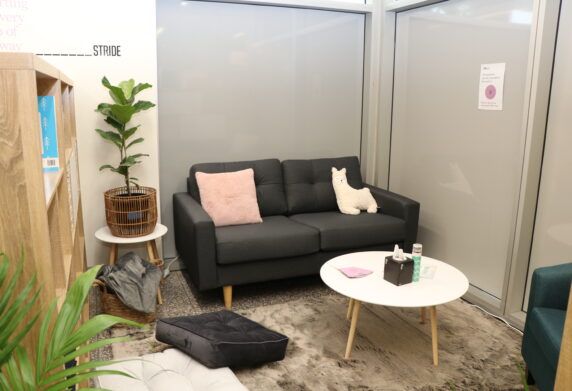


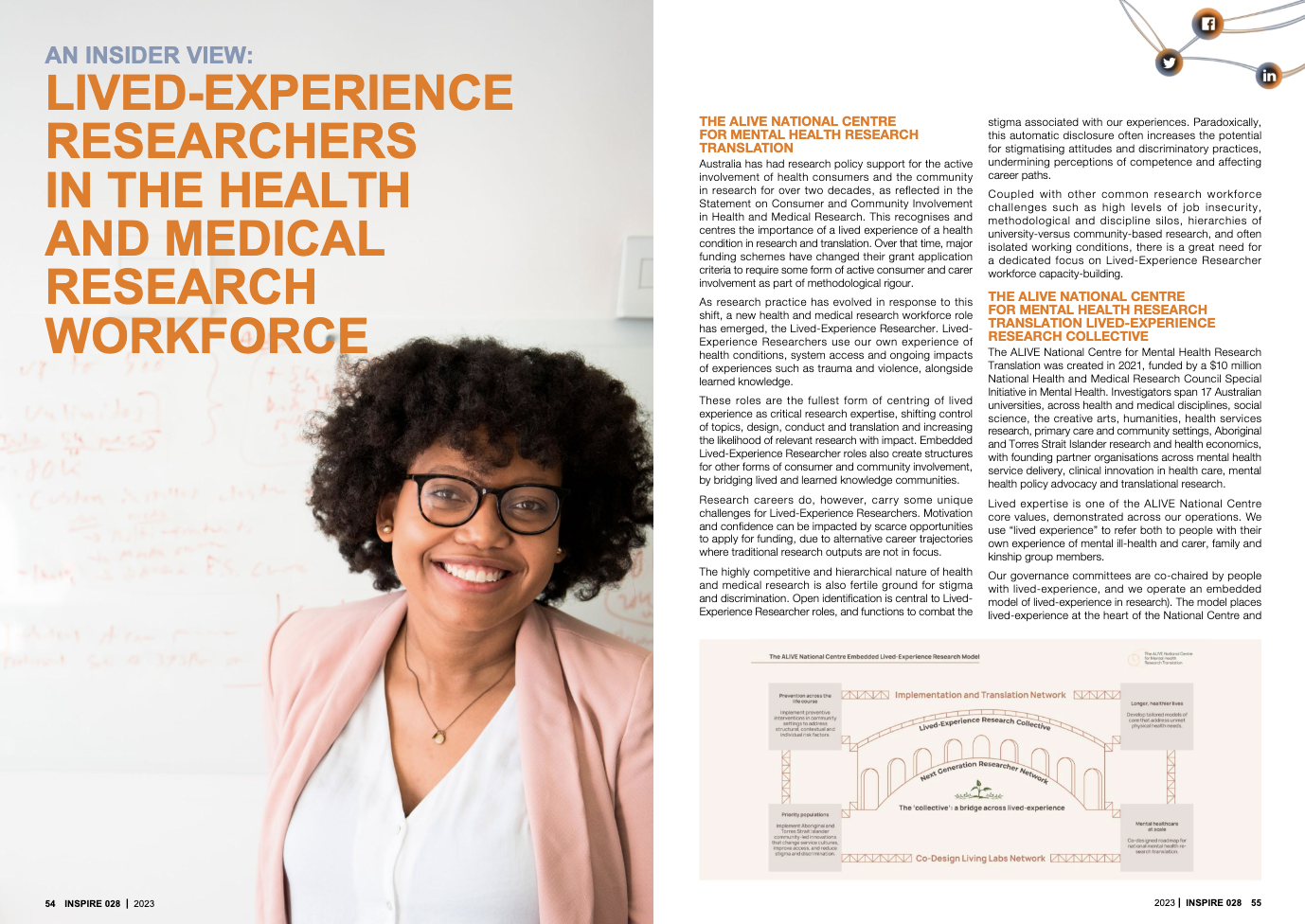
Previously known as the ALIVE National Community Update, we have undergone a massive redesign for spring with the aim of bringing you the latest in mental health research in what we hope is an engaging and dynamic format. Each quarter we will release this zine with feature articles about key translational activities in the sector.
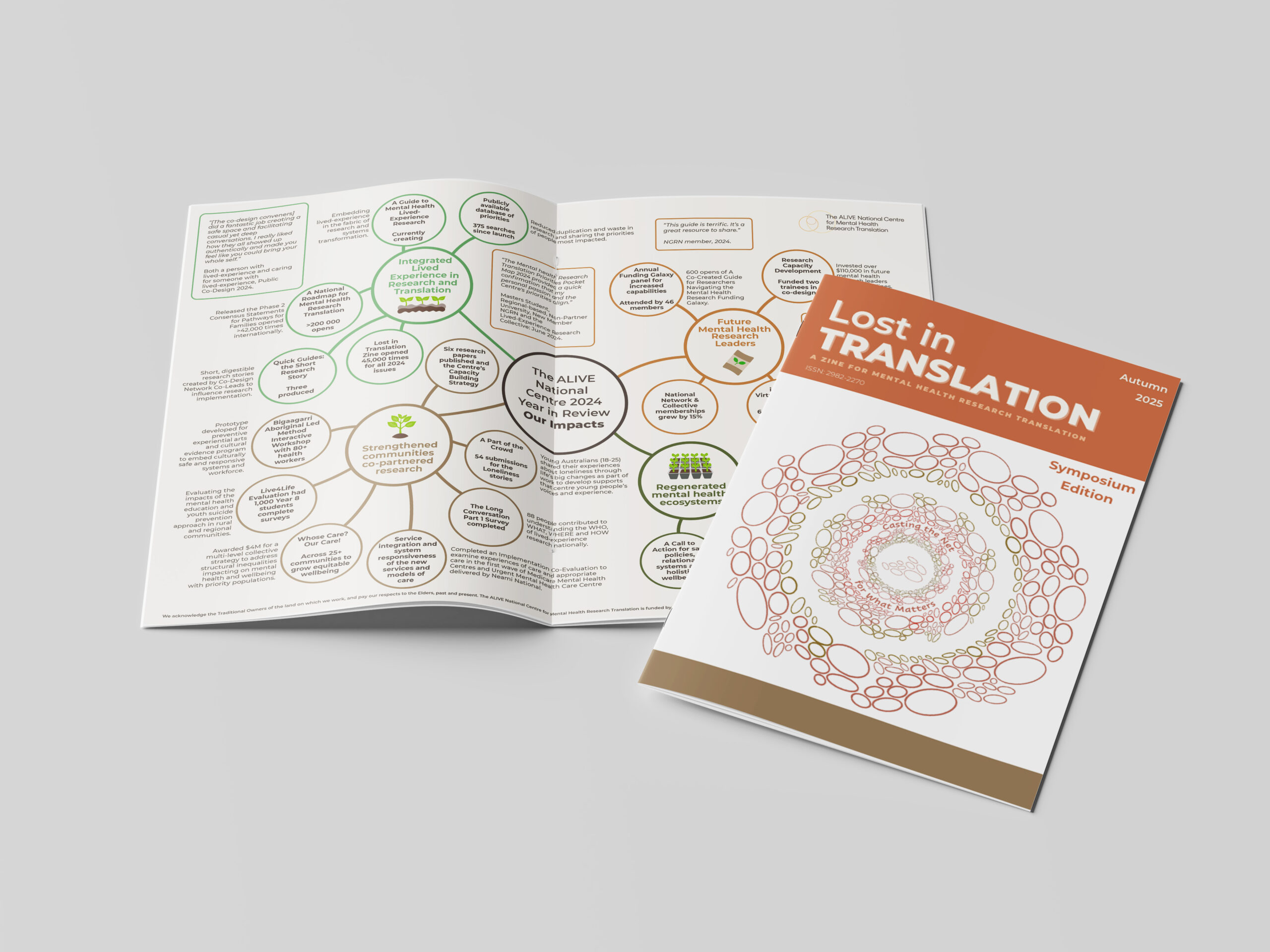
Our Phase 3 Consensus Statement brings together voices of young people living with mental ill-health, and carers, family or kinship group members supporting people aged 16-25 years old, and people who have both experiences, to share priorities and implementation actions. We thank the Australian National University for partnering on this study.
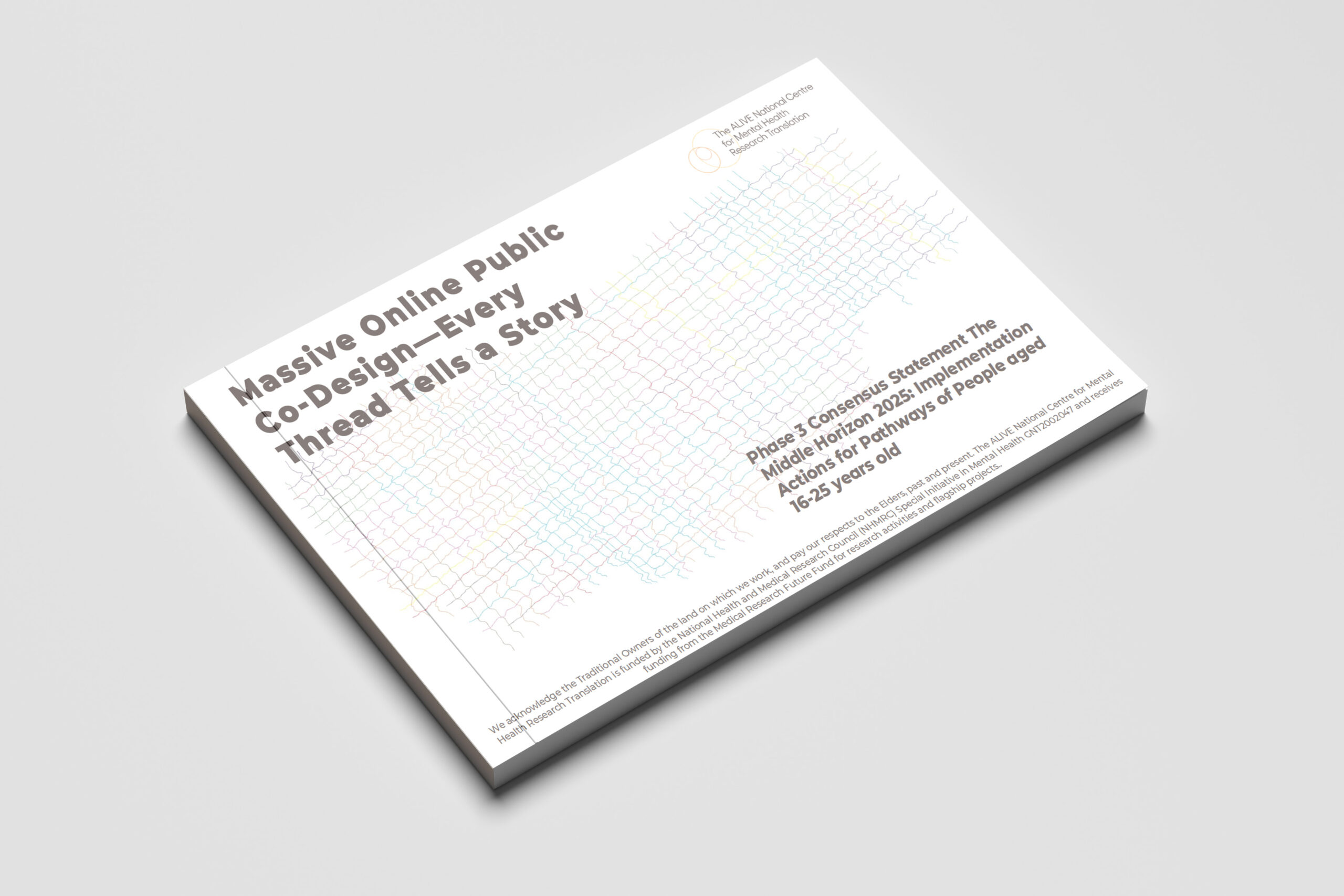
Our Phase 2 Consensus Statement brings voices of parents living with mental ill-health, partners and young adults (16+), and family members together to share priorities and action areas. We thank the Prato International Research Collaborative for partnering on this survey.
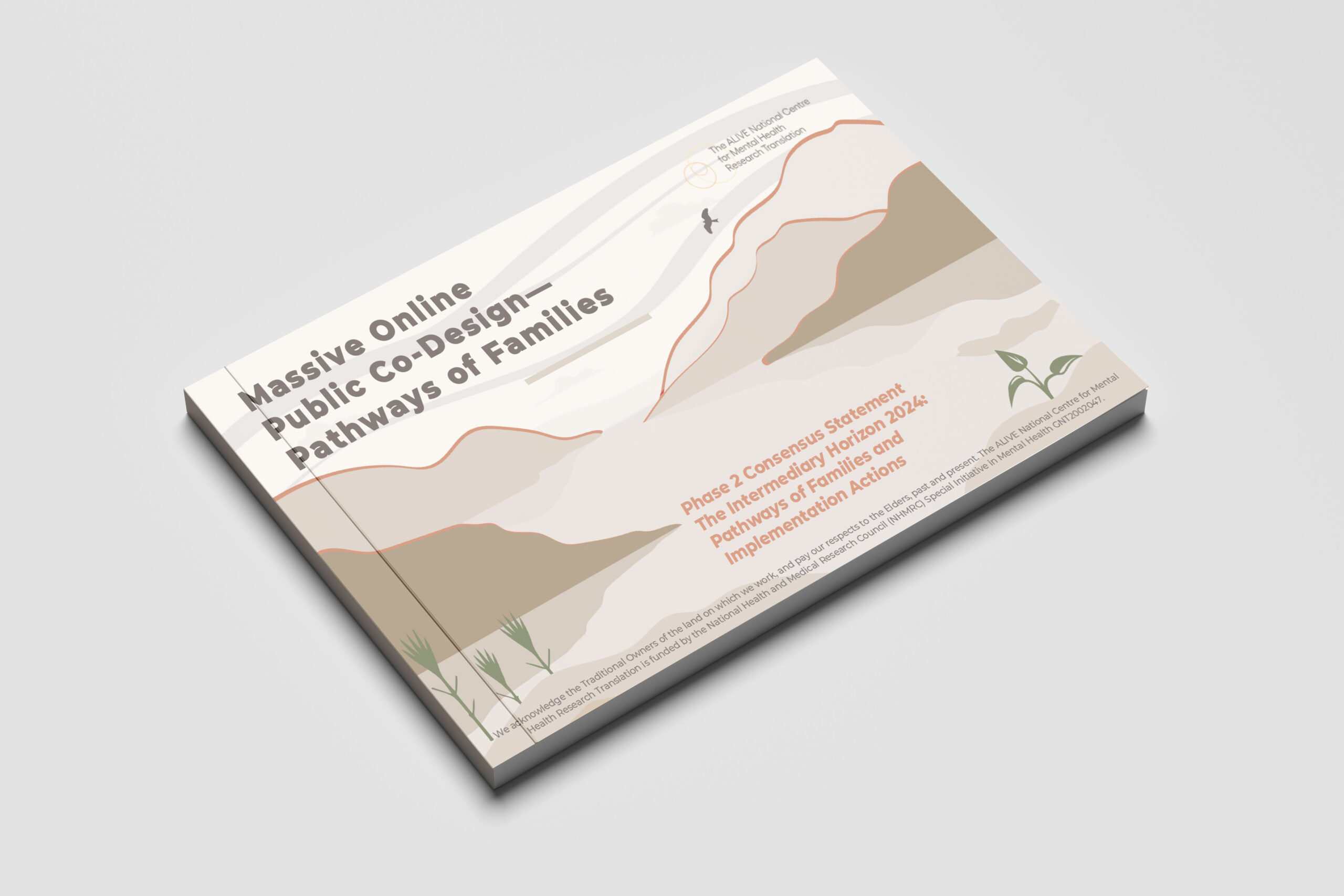
Our Phase 1 Consensus Statement was co-designed with 115 people with lived-experience of mental ill-health and carer/family and kinship group members over 2022. These actions will inform further translation goals and targets for our national roadmap.
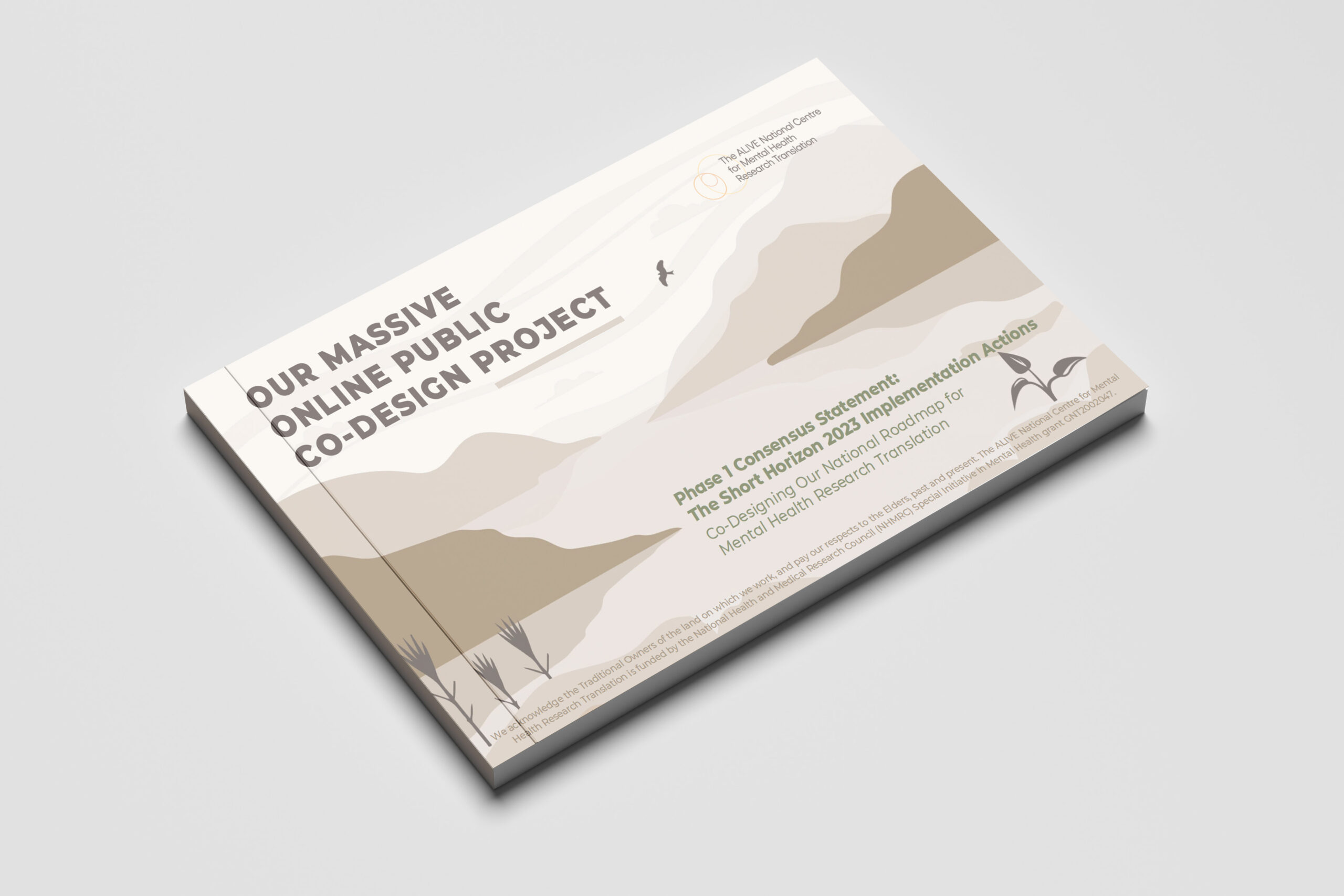
Lakshmi Neelakantan, Nina Logan, Monika Raniti, Nicola Reavley.
SSM – Mental Health, June 2025
Kisely, S., Bull, C., Zirnsak, T., Edan, V., Gould, M., Lawn, S., … & Brophy, L. (2025). Variations between, and within, jurisdictions in the use of community treatment orders and other compulsory community treatment: study of 402 060 people across four Australian states. BJPsych open, 11(2), e57.
Bull, C., Spilsbury, K., Lawrence, D., Saxby, K. I., & Kisely, S. (2025). The impact of COVID-19 on participation in Australia’s National Bowel Cancer Screening Program by people with severe mental illness: A national data linkage study. Australian & New Zealand Journal of Psychiatry, 00048674251336034.
Trott, M., Bull, C., Najman, J. M., Siskind, D., Arnautovska, U., & Kisely, S. (2025). Do internalising or externalising behaviours in adolescence mediate the child maltreatment‐alcohol substance use relationship?. Addiction, 120(7), 1413-1421.
Trott, M., Bull, C., Najman, J. M., & Kisely, S. (2025). Associations between self-reported and agency-reported child maltreatment and mental illness in later life: Results from the CALM study. Child Abuse & Neglect, 163, 107433.
Bull, C., Trott, M., & Kisely, S. (2025). Addressing the challenges of child maltreatment measurement: Examining the types of data we use and how we use them. Australian & New Zealand Journal of Psychiatry, 59(4), 301-303.
Kisely, S., Spilsbury, K., Bull, C., Jordan, S., Kendall, B. J., Siskind, D., … & Lawrence, D. (2024). Rates of colorectal cancer diagnosis and mortality in people with severe mental illness: results from Australia’s National Bowel Cancer Screening Programme. Epidemiology and Psychiatric Sciences, 33, e79.
Kisely, S., Zirnsak, T., Maylea, C., Bull, C., & Brophy, L. (2024). Latest findings highlight the continuing uncertainty over the utility of compulsory psychiatric treatment in the community. BJPsych Open, 10(5), e133.
Kisely, S., Zirnsak, T., Corderoy, A., Ryan, C. J., & Brophy, L. (2024). The benefits and harms of community treatment orders for people diagnosed with psychiatric illnesses: A rapid umbrella review of systematic reviews and meta-analyses. Australian & New Zealand Journal of Psychiatry, 58(7), 555-570.
Kisely, S., Seth, R., Jordan, S. J., Kendall, B., Siskind, D. J., Sara, G., … & Lawrence, D. M. (2024). Participation in the National Bowel Cancer Screening Program by people with severe mental illness, Australia, 2006–2019: a national data linkage study. Medical Journal of Australia, 221(11), 617-622.
Bull, C., Trott, M., Najman, J. M., Reid, N., & Kisely, S. (2024). Risk factors associated with child maltreatment in the second generation of a prospective longitudinal Australian birth cohort: A MUSP study. Social Science & Medicine, 362, 117402.
Kisely, S., Bull, C., Trott, M., Arnautovska, U., Siskind, D., Warren, N., & Najman, J. M. (2024). Emergency department presentations and admission for common mental disorders following agency-notified child maltreatment at 40-year follow-up: results from the Childhood Adversity and Lifetime Morbidity study. BJPsych Open, 10(6), e220.
Trott, M., Bull, C., Najman, J. M., Arnautovska, U., Siskind, D., Warren, N., & Kisely, S. (2024). Hospital admissions and community health service contacts for mental illness following self-reported child maltreatment: Results from the Childhood Adversity and Lifetime Morbidity (CALM) study. Child Abuse & Neglect, 154, 106912.
Bull, C., Trott, M., Najman, J. M., Arnautovska, U., Siskind, D., Warren, N., & Kisely, S. (2024). Associations between child maltreatment and hospital admissions for alcohol and other substance use‐related disorders up to 40 years of age: Results from the Childhood Adversity and Lifetime Morbidity study. Addiction, 119(7), 1253-1263.
Trott, M., Bull, C., Arnautovska, U., Siskind, D., Warren, N., Najman, J. M., & Kisely, S. (2024). Emergency department presentations for injuries following agency-notified child maltreatment: results from the childhood adversity and lifetime morbidity (CALM) study. Child maltreatment, 10775595241264009.
Kisely, S., Arnautovska, U., Siskind, D., Warren, N., & Najman, J. M. (2024). Admissions for psychosis following agency-notified child maltreatment at 40-year-follow-up: results from the childhood adversity and lifetime morbidity (CALM) cohort. Schizophrenia Research, 267, 247-253.
Kisely, S., Bull, C., Trott, M., Arnautovska, U., Siskind, D., Warren, N., & Najman, J. M. (2024). Emergency department presentations for deliberate self-harm and suicidal ideation in 25–39 year olds following agency-notified child maltreatment: results from the Childhood Adversity and Lifetime Morbidity (CALM) study. Epidemiology and psychiatric sciences, 33, e18.
Anemaat, L. N., et al. (2024). “Understanding experiences, unmet needs and priorities related to post-stroke aphasia care: stage one of an experience-based co-design project.” BMJ Open 14(5): e081680.
Bull et al (2024) Associations between child maltreatment and hospital admissions for alcohol and other substance use-related disorders up to 40 years of age: Results from the Childhood Adversity and Lifetime Morbidity study Addiction
Gautam, N., et al. (2024). “Socioeconomic inequalities in child and adolescent mental health in Australia: the role of parenting style and parents’ relationships.” Child and Adolescent Psychiatry and Mental Health 18(1): 28.
Hashmi, R., et al. (2024). “Socioeconomic mental health disparities and income mobility in Australia: A longitudinal factor decomposition analysis.” Economic Analysis and Policy 82: 290-302
Nixon, N., et al. (2024). “Specialist treatment for persistent depression in secondary care: Sustained effects from a multicentre UK study at 24 and 36 months.” Journal of Affective Disorders 345: 70-77.
Vargas, N. T., et al. (2024). “Acute ingestion of Ibuprofen does not influence the release of IL-6 or improve self-paced exercise in the heat despite altering cortical activity.” European Journal of Applied Physiology.
Waks, S., et al. (2024). “Consumers lived experiences and satisfaction with sub-acute mental health residential services.” Social Psychiatry and Psychiatric Epidemiology.
Calear, A. L., et al. (2024). “Designing a Web-Based Navigation Tool to Support Access to Youth Mental Health Services: Qualitative Study.” JMIR Formative Research 8(1).
Kisely, S., Leske, S., Arnautovska, U., Siskind, D., Warren, N., Northwood, K., … & Najman, J. M. (2023). A 40-year study of child maltreatment over the early life course predicting psychiatric morbidity, using linked birth cohort and administrative health data: Protocol for the Childhood Adversity and Lifetime Morbidity (CALM) study. BJPsych open, 9(2), e50.
Coe, A., et al. (2023). “A mixed-methods evaluation of the impacts of an online Carer wellbeing and connection program.” PEC Innovation 3.
Neil, A. L., et al. (2023). “Outdoor mental healthcare: What, who, why and where to?” Australasian Psychiatry 31(6): 798-805.
Neil, A. L., et al. (2023). “Exploring the relationship between baseline health-related quality of life (AQoL-4D utility values) and mortality during long-term follow-up for people living with a psychotic disorder.” Schizophrenia Research 262: 121-129.
Parker, E. L., et al. (2023). “Anxiety management in Australian general practice: an analysis of encounters from 2006 – 2016.” BMC Primary Care 24(1).
Fitzpatrick, S. J., Gallagher, K., Banfield, M., Gulliver, A., Calear, A. L., Conroy, S., & Batterham, P. J. (2023). At arm’s length: A qualitative study of suicide prevention barriers among those experienced with suicide loss. SSM – Qualitative Research in Health, 4, 100318.
Xue, Y., et al. (2023). “A scoping review of cardiovascular risk factor screening rates in general or family practice attendees living with severe mental ill-health.” Schizophr Res 261: 47-59.
Blackstock, C., et al. (2023). Decolonizing First Peoples child welfare. The Routledge International Handbook on Decolonizing Justice: 313-323.
Flies, E. J., et al. (2023). “Bridging the evidence gap: A review and research protocol for outdoor mental health therapies for young Australians.” Journal of Outdoor and Environmental Education.
Pu, D., et al. (2023). “Virtual emergency care in Victoria: Stakeholder perspectives of strengths, weaknesses, and barriers and facilitators of service scale-up.” Australasian Emergency Care.
Neil, A. L. (2023). “Out-of-pocket payments: impacts on healthcare decision-making and system and individual level measures to minimise the burden.” Australian Health Review.
Curran, E., et al. (2023). “Physical Activity for Cognitive Health: A Model for Intervention Design for People Experiencing Cognitive Concerns and Symptoms of Depression or Anxiety.” Journal of Alzheimer’s Disease 94(2): 781-799.
Hermeston, W. (2023). “First Nations Children and Families and Permanency Planning Reform: The Evidence Counts.” Australian Social Work 76(3): 358-370.
Tjung, C., et al. (2022). “Design Features of Learning Apps for Mobile Gamification: Graphic Designers Use Co-design to Prompt Young Children to Speak.” Visible Language 56(3): 32-57.
Chatterton, M. L., et al. (2022). “Economic evaluation of a Decision Support Tool to guide intensity of mental health care in general practice: the Link-me pragmatic randomised controlled trial.” BMC Prim Care 23(1): 236.
Robins-Browne, K., et al. (2022). “Interventions to support the mental health and well-being of front-line healthcare workers in hospitals during pandemics: an evidence review and synthesis.” BMJ Open 12(11): e061317.
Feleke, R., et al. (2022). “Integrative genomics reveals pathogenic mediator of valproate-induced neurodevelopmental disability.” Brain 145(11): 3832-3842.
Taylor, A. K., et al. (2022). “Patient reported self-help strategies and the perceived benefits for managing sub-threshold depressive symptoms: A nested qualitative study of Australian primary care attendees.” Health Soc Care Community 30(5): e2097-e2108
Godbee, K., et al. (2022). “Dementia Risk Reduction in Primary Care: A Scoping Review of Clinical Guidelines Using a Behavioral Specificity Framework.” J Alzheimers Dis 89(3): 789-802.
Palmer, V. J., et al. (2021). “The CORE study-An adapted mental health experience codesign intervention to improve psychosocial recovery for people with severe mental illness: A stepped wedge cluster randomized-controlled trial.” Health Expect 24(6): 1948-1961.
Anemaat, L., et al. (2021). “Using experience-based codesign to coproduce aphasia rehabilitation services: Study protocol.” BMJ Open 11(11).
Calear, A. L., Morse, A. R., & Banfield, M. (2024). ‘This is doin’My Head in’: The Ethics of Psychological Research. In The Routledge Handbook of Human Research Ethics and Integrity in Australia (pp. 238-250). Routledge.
Morse AR, Smith DG, Clifford R, Shrimpton B & Banfield M. (2024) Starting conversations about mental health and wellbeing in Australian Culturally and Linguistically Diverse Communities. Health Promotion International, 39: daae099
Calear AL, Batterham PJ, McCallum S, Banfield M, Moore E, Johnson N & Morse AR. (2024). Designing a web-based navigation tool to support access to youth mental health services: qualitative study. JMIR Formative Research, 8:e48945
Fitzpatrick SJ, Lamb H, Stewart E, Gulliver A, Morse AR, Giugni M, Banfield M. (2023) Co-ideation and co-design in co-creation research: Reflections from the ‘Co-Creating Safe Spaces project’. Health Expectations, 26(4):1738-1745 https://doi.org/10.1111/hex.13785
Raniti, M., Rakesh, D., Patton, G. C., & Sawyer, S. M. (2022). The role of school connectedness in the prevention of youth depression and anxiety: a systematic review with youth consultation. BMC public health, 22(1), 2152.
Heerde, J., Raniti, M., & Sawyer, S. (2023). Health-promoting schools: An opportunity to strengthen responses to homelessness and health disparities in children and adolescents. Parity, 36(2), 37-40.
Protani, M. M., Alotiby, M. K. N., Seth, R., Lawrence, D., Jordan, S. J., Logan, H., … & Kisely, S. (2022). Colorectal cancer treatment in people with severe mental illness: a systematic review and meta-analysis. Epidemiology and Psychiatric Sciences, 31, e82.
Protani, M. M., Jordan, S. J., Kendall, B. J., Siskind, D., Lawrence, D., Sara, G., … & Kisely, S. (2021). Colorectal cancer Outcomes in people with Severe Mental Illness Cohort (COSMIC): a protocol for an Australian retrospective cohort using linked administrative data. BMJ open, 11(6), e044737.
ALIVE Next Generation Researcher Network Application Form Click here
For University based research higher degree students, early/mid-career mental health researchers
ALIVE Lived Experience Research Collective Application Form Click here
For University and community based lived-experience or carer-focused mental health researchers at all career stages
ALIVE Collective Application Form Click here
For any individuals or organisations with a general interest in supporting the special initiative in mental health
ALIVE Implementation and Translation Network (ITN) Application Form Click here
For sector, service delivery organisations in mental health serving people across the life course and priority populations
If you have a general enquiry about The Alive National Centre for Mental Health Research Translation, please submit an enquiry below